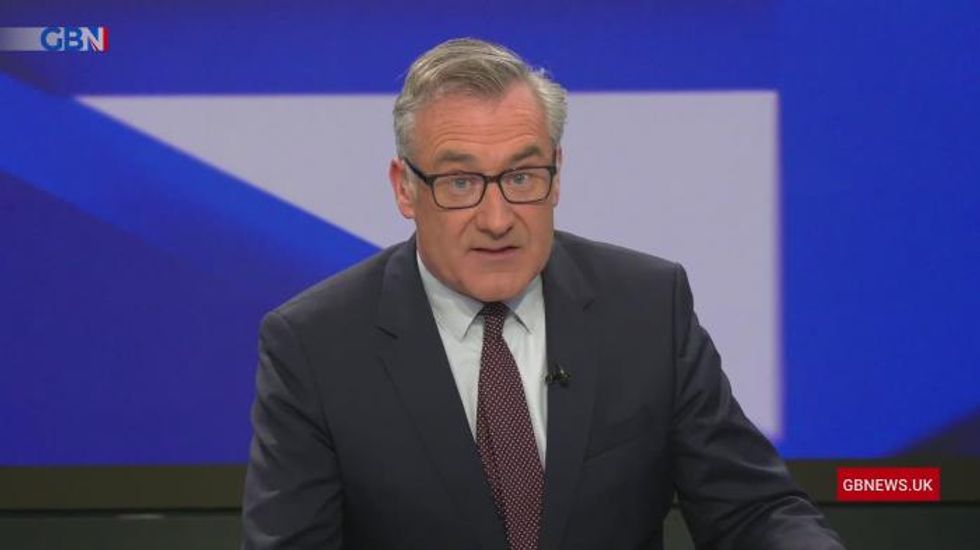Don't Miss
Most Read
Trending on GB News
It has been my unpleasant journalistic duty to report from the scene of a host of Islamist terror attacks. From Nice to Nairobi, from Tunisia to Turkey. And although they’re all different, they also follow a pattern, albeit one that has taken time to take shape. Increasingly, I think, there’s a reluctance to look at the event full in the face, lest it produces questions too awkward to answer. As my colleague Dan Wootton has pointed out, it was bizarre that at a Downing Street press conference yesterday – five hours after a taxi blew up outside the Women’s Hospital in Liverpool – there was not a single question about it to the Prime Minister.
We shouldn’t be surprised by that. Last month, after the MP Sir David Amess was killed, there was the surreal spectacle of politicians and pundits trying blame the fatal attack on the toxic nature of political discourse. As if Sir David had lost his life to a series of unpleasant tweets, not wounds inflicted by a knife.
This morning we were at it again. On a radio phone-in I heard one commentator attribute events on Merseyside to lockdown. Months of being cooped up had left impressionable young minds vulnerable.
There is a kind of mass displacement at work. A terror attack happens and the commentariat’s first instinct is to blame MI5 or the police, or the failings of PREVENT, or – this morning – covid. Terrorism presented as an authorless phenomenon, like a natural disaster. The perpetrator sometimes feels like an afterthought.
This has been going on for two decades now, and it’s getting harder to sustain. After 9/11 it was the done thing to blame British imperialism or Western intervention in the Middle East. But this started to wear thin when we looked at the demands of the terrorists.
I remember standing outside the Atocha train station in Madrid in 2004, reading out Al Qaeda’s list of demands. The assumption, the Western assumption, was that it would all be about America’s invasion of Iraq, which Spain then supported. The actual list of demands started with the Islamic reconquest of Andalucia. In other words, the righting of a 700-year-old wrong.
Then, for a while, the fashionable narrative became one of poverty. The Yorkshiremen who decided to blow themselves up on the Underground on 7/7 were victims of social exclusion. But that didn’t last long either.
I remember standing outside the shattered frontage of Glasgow airport in 2007, where a doctor and engineer – highly educated, highly paid men – had driven a Jeep packed with gas cannisters.
I would have more sympathy with my media colleagues were they not normally so obsessed with blaming individuals when things go wrong. Some now seem to view their role as therapeutic; part of a healing process; prescribing social cohesion, lest the natives get restless.
It’s safer to focus on teddy bears and floral bouquets, than it is to turn over the rights and wrongs of violent jihadism live on air. It’s safer to film candle-lit vigils and books of condolence than it is to wonder if communities are doing enough to identify militants. It’s safer to talk about inter-faith dialogue and prime ministerial visits, than it is to wonder if someone smuggled themselves here as a migrant.
Four years ago, I stood for a week in a square in Manchester, as it slowly filled with hand-written tributes and helium balloons. Acts of sweetness which belied the reality of what had happened to the bodies of 22 people, some of them children, at the hands of a suicide bomber.
As I stood there, PART of this mass editorial digression, I realised what was happening. It was as if to blame a terrorist had become an act of victim shaming. You can't possibly blame the man who wore the suicide belt. It's not his fault. He was brainwashed. He was vulnerable. He was young. He was, in his own way, a victim too. Nobody's to blame, except maybe us - for not having the wit to see the attack coming.
This is where we are. What will it take to recapture the intellectual self-confidence to speak plainly again? To discuss jihadist terror, if that's what this was, without acting as if it's a natural occurrence, like extreme weather. And without worrying we'll be called out for hate-speech?
Well, I'm afraid to say that if an attack on a children’s music concert didn't bring that about, there’s little chance that an attempted suicide bombing against a women’s hospital will.











